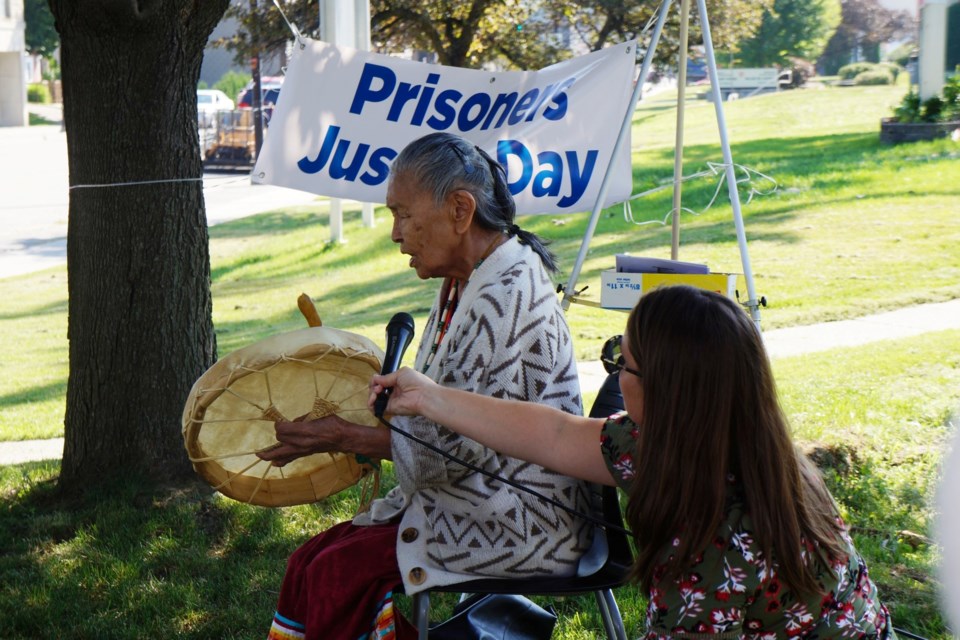At the annual Aug. 10 Prisoners’ Justice day memorial, a group of 40 listened to the words of those who work with incarcerated people. Words were spoken and tears shed, with a message summed up by Kaela Pelland, director of peer engagement at Réseau ACCESS Network.
“When we invest in the health of incarcerated people, people live longer, and people can leave jail on foot and not in a bag.”
Prisoners’ Justice day has been an annual event since 1974, and is honoured by prisoners and community groups alike. In Sudbury, on the front lawn of the Sudbury District Jail, The Canadian Mental Health Association, Elizabeth Fry Society of Northeastern Ontario, Réseau ACCESS Network, and the John Howard Society of Sudbury.
The memorial began in a good way with elder Winnie Pitawanakwat, who smudged the circle, and sang a welcome song and then a travelling song, sometimes used at funerals. She encouraged everyone to sing along.
The event was hosted by Sara-jane Berghammer, John Howard Society CEO. The first speaker was Cory Roslyn of the Elizabeth Fry Society. The society specializes in helping women and gender non-conforming people who are incarcerated or at risk of justice-involvement.
“An overwhelming number of women and gender diverse people who are incarcerated have experienced abuse prior to their incarceration, including sexual violence, and they carry with them extensive histories of trauma,” said Roslyn.
At present, said Roslyn, 79 per cent of those incarcerated in Ontario correctional facilities are on remand, not convicted of the crimes they have been charged with.
“The remand population is highly over-represented by marginalized groups, including Indigenous peoples, those who experience homelessness, poverty, and those who have been criminalized for their mental health or substance use.”
Rosyln said that Elizabeth Fry Society continues to call for a “divestment from incarceration, and an investment in community resources as a more effective way of preventing and addressing harm.”
In 2014, 19 people died while in custody in Ontario facilities. In 2021, at the height of the pandemic, that number had risen to 46. The cumulative number of deaths in that eight-year period reached 192.
In Ontario, deaths due to accidental drug toxicity and deaths by suicide featured heavily alongside accidental and natural causes in correctional centers.
“They are an inherently violent and harmful place for both those who are working there and those who are incarcerated there,” said Roslyn.
The care of those with mental health or substance use issues is a need not being met, said Sue Tassé of the Canadian Mental Health Association.
“There is an over-representation of people with mental health and or substance use issues and correctional facilities across the province and across the country,” said Tassé.
She said that mental illness rates are four to seven times more common in correctional institutions than in the community, and research indicates that at least seven out of 10 incarcerated individuals in the federal correctional system have engaged in problematic use of alcohol and other drugs during the one-year period prior to their incarceration.”
Tassé said that CMHA supports providing people with mental health and substance use with appropriate mental health services. It’s a statement made every year at the event: Health care should be managed by the Ministry of Health. Currently, the health of incarcerated people is managed by the Ministry of the Solicitor General.
More than anything, said many of the speakers, the point is to see incarcerated people as people, not prisoners.
As Pelland continued speaking, she told the crowd she stood with a heavy heart, having lost a good friend in January when he died while in custody. And though she shed a few tears, she noted the work that her peers had been doing to help, as in the past 18 months, the team at Réseau ACCESS Network has engaged with 55 incarcerated individuals and have linked a total of 35 people to hepatitis C treatment in the Sudbury District Jail.
“Their work is admirable to say the least,” she said. “And a model I hope to see across the province and the country.”
“I stand here with a heavy heart, but I do not stand alone,” she said. “I stand with community partners, I stand with friends, and some of my incredible colleagues who have pushed tooth and nail to provide health and supportive services in this region, creating opportunities for support.
Pelland spoke of her friend, a peer engagement worker at Réseau, Randy, who died while incarcerated.
“Randy was one of the sweetest people I've ever had the pleasure of meeting. He had an infectious laugh and an amazing way of storytelling.” She said that when Randy died an unnatural death in the Sudbury jail on Jan. 18, “the news shocked and saddened us.”
She said she tried to make peace with the idea, but has never quite managed.
“With all that grief and love, lives a very, very deep and justified rage. I'm angry that Randy suffered so much until his death. I'm angry that the community has lost another beautiful human being. And I'm angry that Randy's story is like so many other stories. People who are incarcerated have a right to live with dignity, have a right to health care, they have a right to safety.”
Jenny Lamothe covers vulnerable and marginalized communities for Sudbury.com.
